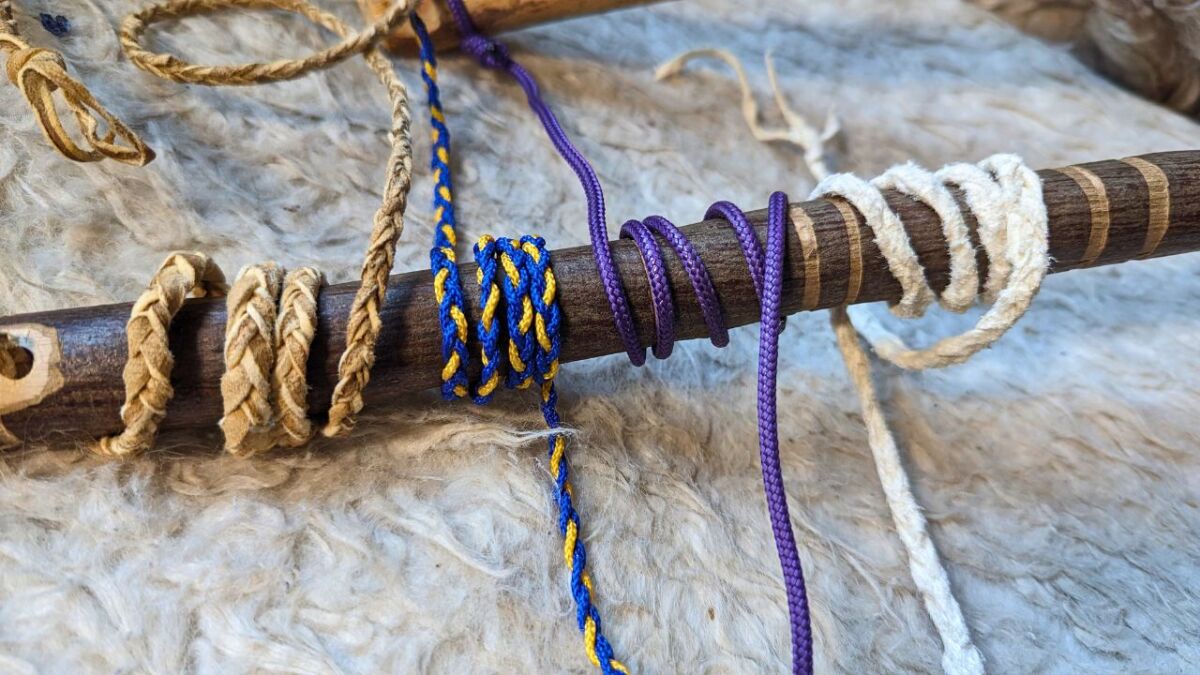
Which cord for the bow drill? - How to choose the right bow drill cord (comprehensive list of cord types)
👉 The key facts from this guide
- Leather cord is the best choice for the bow drill due to its durability, strong grip, and control when making fire.
- Here you will find a comprehensive comparison table of different types of cords with ratings of their robustness, friction, tension, and availability/cost.
- Nettle, bast (linden), hemp, jute, and cotton are natural cord options, each offering specific characteristics in durability, flexibility, and environmental friendliness.
- Paracord, polypropylene, and rope cord are modern plastic cords with different attributes for the bow drill, each with its advantages and disadvantages.
- Buckskin, rawhide, and sinew are traditional, animal-derived materials that provide a deep connection to nature and the origins of fire making.
- Choosing the right cord for the bow drill depends on personal values, needs, and respect for the environment; it is part of the ritual and art of fire making.
I know the scenario: You are eagerly planning your next wilderness adventure or cozy overnighter under the open sky.
Everything seems perfect until it turns out that the cord for your bow drill brings more trouble than warmth. The wrong choice, and you're left out in the cold.
Imagine how you ignite sparks with a smile on your face because you have already chosen the ideal string beforehand.
You need a string that doesn't give up in the middle of use, but one that works faithfully like a wildfire.
I, with my many years of experience as a bushcraft expert and wilderness educator, will now show you the way.
I know what matters: Durability meets nature connection, and that at the campfire.
Let's make sure together that your cord is the final link in a powerful chain of survival skills.
Are you ready? Then let's find the perfect cord for the bow drill!
What is the best cord for the bow drill?
I have tried many strings, from paracord to jute and even bast string made from the lime tree.
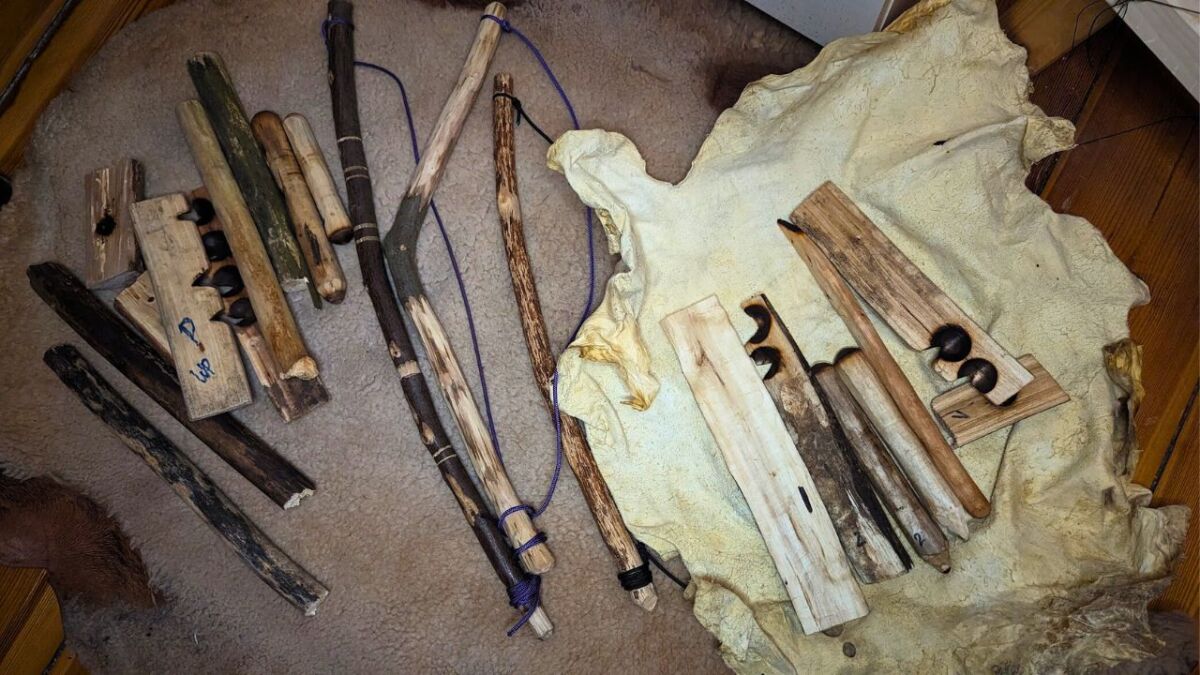
And after years, one material has grown close to my heart because it is so reliable, durable, and grippy:
A leather cord is the best choice for the bow drill. Leather is resistant to wear from friction and provides a firm grip. This allows for controlled and effective application of the technique to create fire.
But let's now compare the strings for the bow drill step by step.
First, you will find an overview in a table. Afterward, you will receive a comprehensive overview and can make a choice for your bow drill at the end.
| Type of Cord | Robustness | Friction (Grip) | Tension | Availability/Cost |
|---|---|---|---|---|
| Nettle | Robust | Good to Medium | Good, does not stretch | Free, can be self-made |
| Bast (Linden) | Strong | Good, can become smooth | Good, does not stretch | Affordable, free, can be self-made |
| Hemp | Robust | Good | Firm | Hardware store, medium price range |
| Jute | Robust | Good | Good, does not stretch | Affordable, hardware store |
| Cotton | Resilient | Good | Needs re-tensioning | Inexpensive, readily available |
| Paracord | Robust | Good | Good, stretches easily | Affordable, widely available |
| Polypropylene | Very tough | Can be improved | Good, does not stretch | Inexpensive, hardware store |
| Accessory Cord | Very robust | Good | Good, stretches easily | Hardware store/Internet, higher price |
| Buckskin | Very durable | Excellent | Needs re-tensioning | Requires effort to find, but worth it |
| Rawhide | Legendary robust | Excellent | Needs re-tensioning | For connoisseurs, difficult to find |
| Sinew | Extremely durable | Excellent | Strong, does not stretch | Rare, difficult to come by |
👆 This table provides a clear overview of the characteristics and suitability of the different types of cord for the bow drill. It is based on my experiences. Each cord has its pros and cons, depending on your specific requirements.
Let's now delve deeper into the world of strings!
Straight from nature: Cord for the bow drill
When you embark on the path of the wilderness educator, survivalist, or bushcrafter, the choice of your equipment is like a silent agreement with Mother Nature.
When looking for the right cord for your bow drill, we start at the source: Natural materials.
They tie your hands to the earth and bring you one step closer to your original goal - the fire.
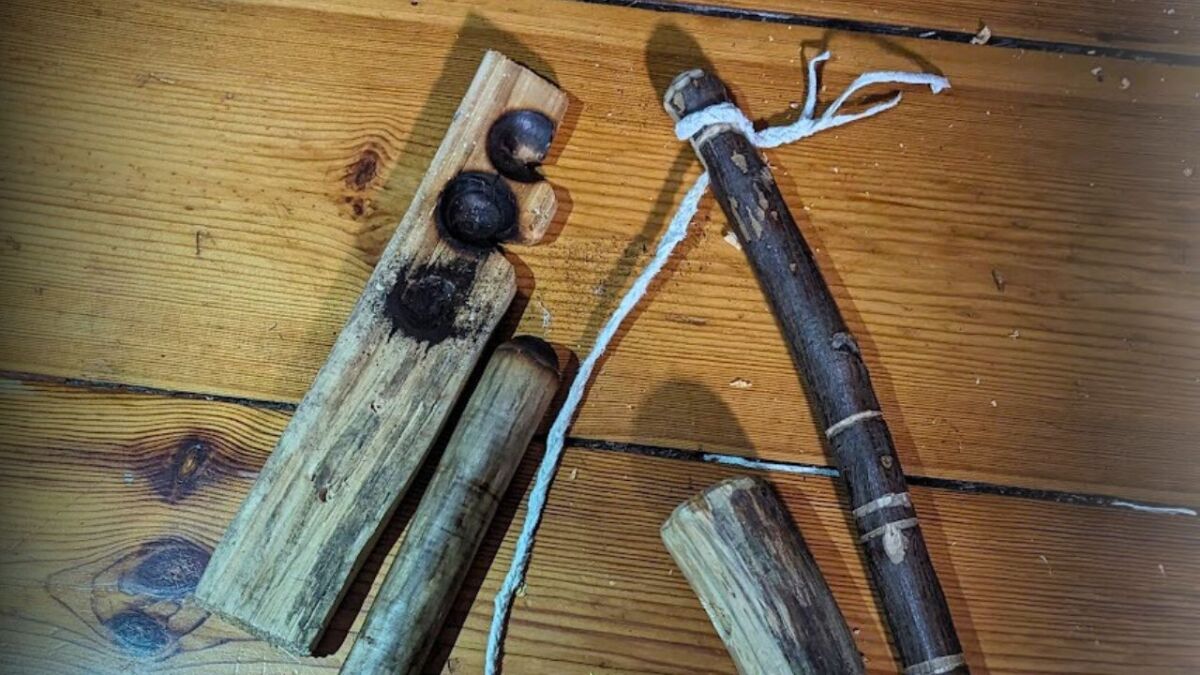
Nettle as Cord - A Wild Surprise
Now it gets wild: Nettle cord.
Don't be fooled by its prickly appearance, this material is durable and can be found in all forests and meadows.
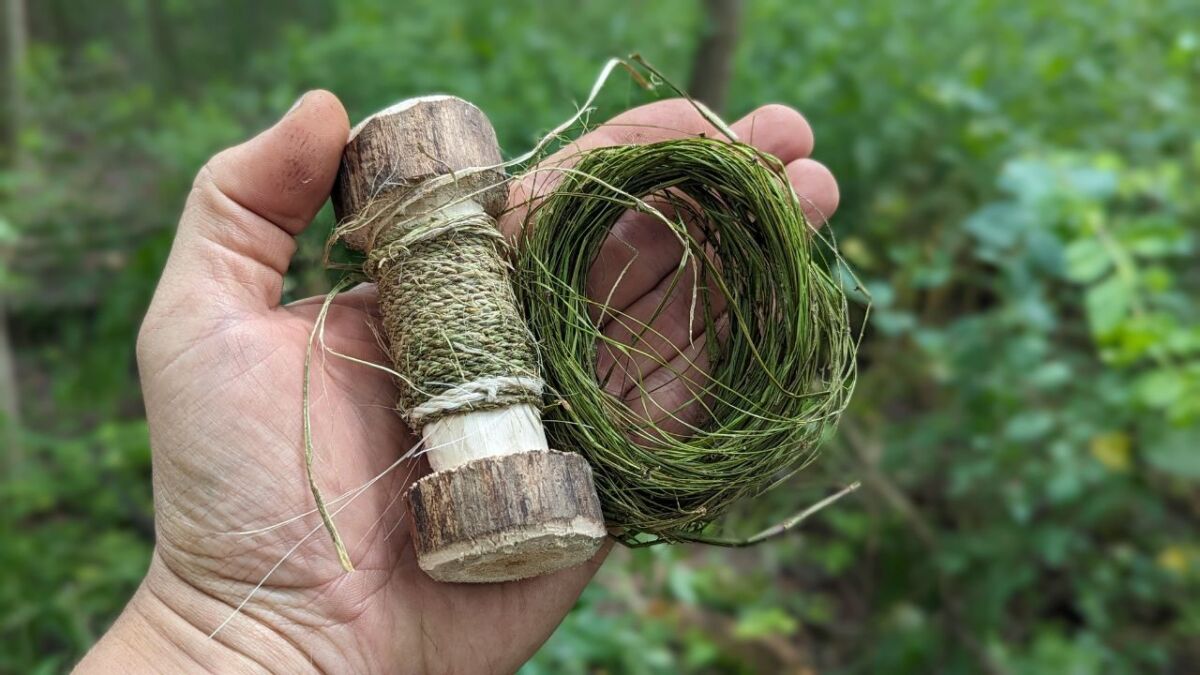
You can process the nettle right in the field and twist a string out of it. In my detailed picture guide, I show you every step to the finished string.
Nettle cord for the fire bow drill? Here are the facts:
- Durability: Hand-knotted, withstands many fires.
- Softness: Surprisingly tender for something so prickly.
- Flexibility: Like an acrobat - bends in all directions.
- Sturdiness: More robust than you think. Nettle doesn't give up easily.
- Friction: Perfect! Has just the bite you need for ignition.
- Tension: Pull tight, but not too tight. Approach bow drilling with sensitivity.
- Environmental friendliness: Comes straight from the field, returns to the earth.
- Care and maintenance: Requires a little care, but it's love that comes back.
- Availability and cost: Free, if you know where and how to find them.
I find nettle cord fascinating. It comes straight from the wilderness and tames the fire like an old flame. Once you have made one yourself, it will never let you go.
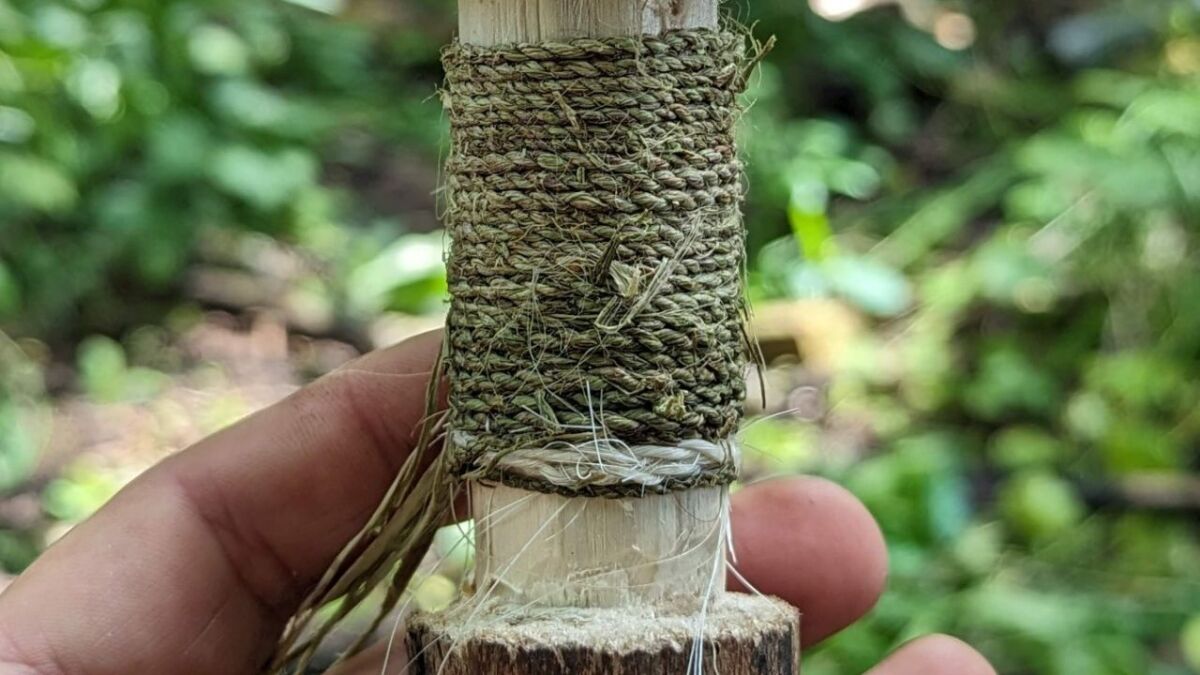
Bast as String - The Nature Artist
Bast is like the poet among the strings: aesthetic, flexible, and full of character. I find my best bast at the lime tree. Every year, I use the small shoots and process them into long strips of bast.
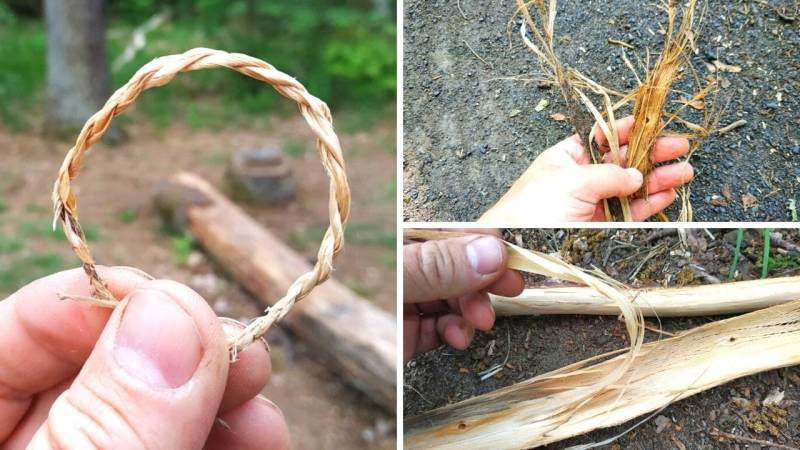
Bast as cord for the bow drill? Here are the facts:
- Durability: Can withstand a few trips, but treat it gently and it will stay with you.
- Softness: A bit rougher, and you'll feel it on your hands.
- Flexibility: Quite good, but the thicker the bast rope, the heavier it gets.
- Robustness: Bast has a strong core and is very robust.
- Friction: Can become smooth over time, making it more challenging.
- Tension: Apply tension with finesse, and it responds with the right posture.
- Environmental Friendliness: Grows on most trees and fades away like a leaf in autumn - completely eco-friendly.
- Care and Maintenance: Prefers dry conditions, so treat it accordingly.
- Availability and Cost: You can get bast either for a few coins or directly from Mother Earth.
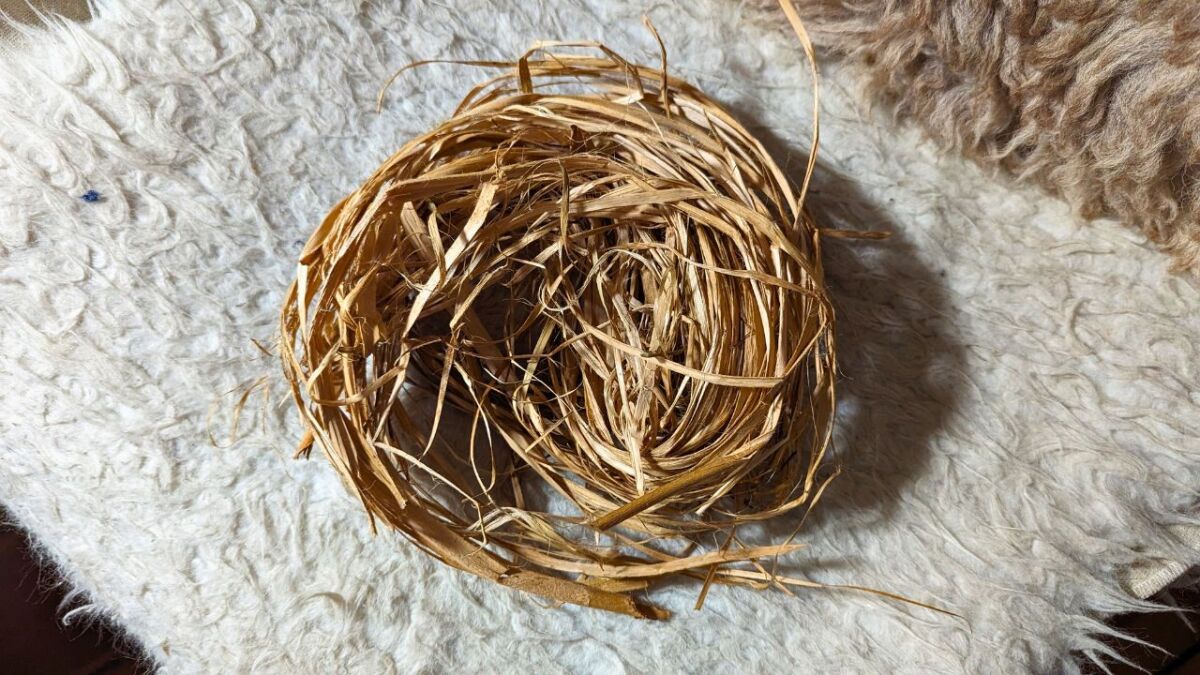
Bast is like a natural work of art to me. It not only connects you with your fire, it tells stories along the way. Every time I use it, I feel like a part of an ancient craft.
Hemp as Rope - A Classic
Let's talk about hemp. Hemp cords are like the classic car among bow drill cords: proven, strong, and always stylish.
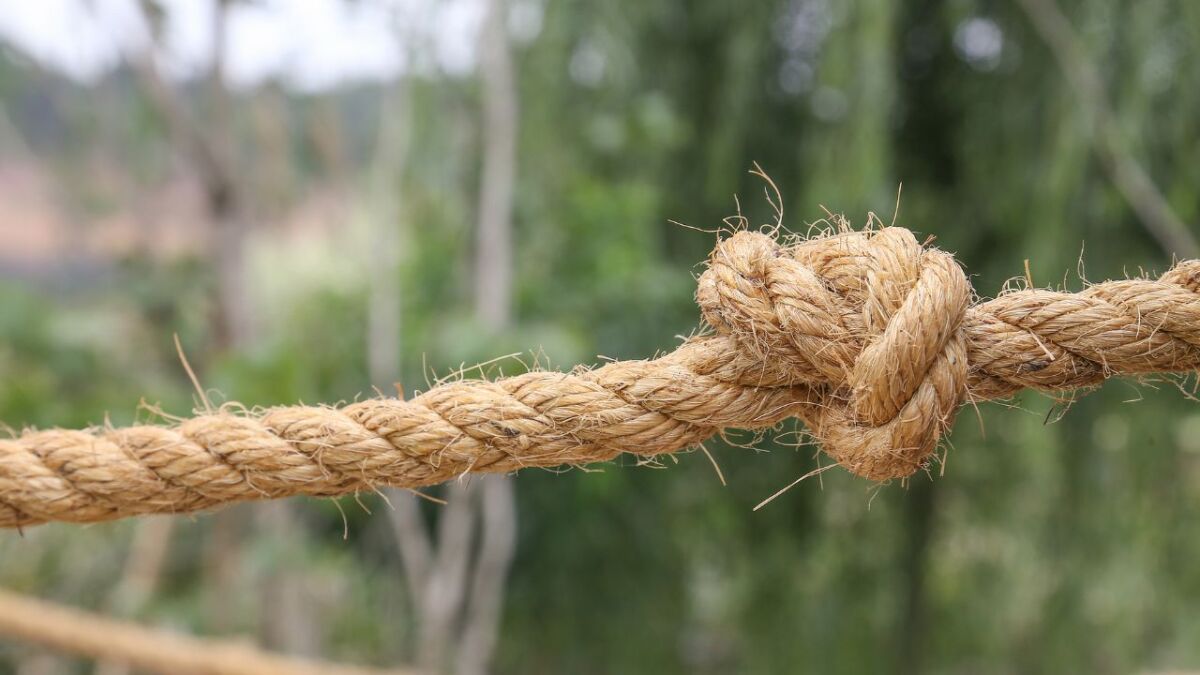
Hemp as cord for the bow drill? Here are the facts:
- Durability: Tough as nails. Hemp can take a beating and withstands many fires.
- Softness: Gives your fingers the right feel without being too soft.
- Flexibility: Flexible enough for the right swing.
- Sturdiness: Hemp doesn't break down as quickly - it's an investment in many campfires.
- Friction: The friction is just right.
- Tension: Can be pulled taut without giving way.
- Environmental Friendliness: Hemp is biodegradable - good for the conscience.
- Care and Maintenance: Simple and straightforward. Moisture? No problem for hemp.
- Availability and Cost: Unfortunately, hemp is not available everywhere. You can only find it in hemp fields in Germany or at the hardware store.
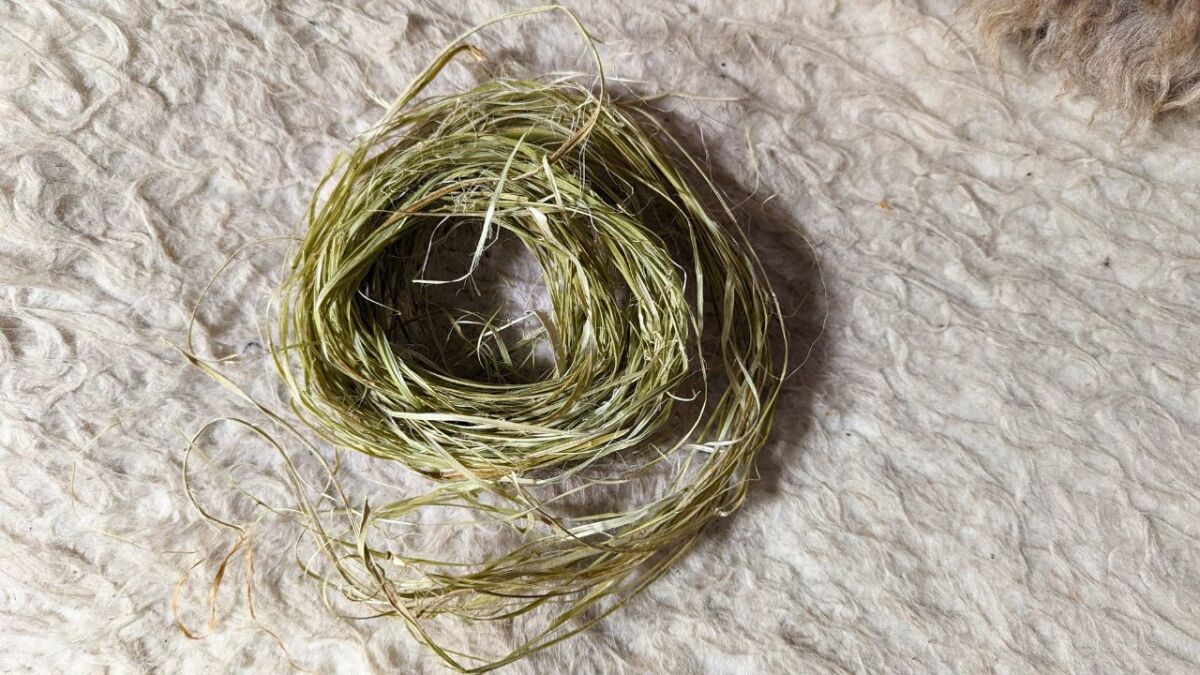
You wonder why I call hemp my own? Because it proves itself time and time again. A bonfire here, a camping trip there - hemp is the reliable buddy you can count on.
Jute as String - More than just Sack Material
Let's continue with jute, the underdog of natural fibers. Not just any sackcloth - no, jute is the hidden hero.
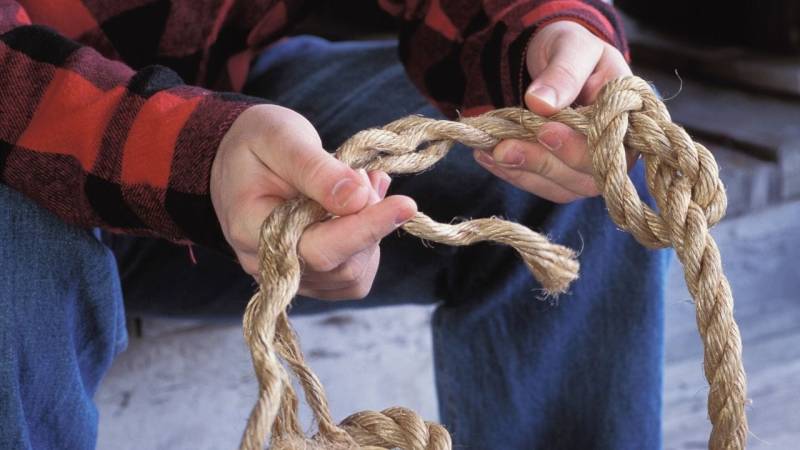
Jute as cord for the bow drill? Here are the facts:
- Durability: Admittedly, jute doesn't last forever, but it will serve you well for a season.
- Softness: Softer than hemp, but that's not a downside. It provides good grip.
- Flexibility: Jute adapts without resistance.
- Sturdiness: Surprisingly robust for such a soft material.
- Friction: I must admit, jute can use a little help - a bit rougher would be nice for fire making.
- Tension: Stretch with caution, but once taut, it holds well.
- Environmental Friendliness: Biodegradable, what more could you want?
- Care and Maintenance: Jute doesn't like getting wet, so keep it dry and it will thank you.
- Availability and Cost: Available from hardware stores or ordered as thick jute rope. Not commonly found outdoors.
Why choose jute? Because it is inexpensive and honest. But beware: when wet, it can get slippery.
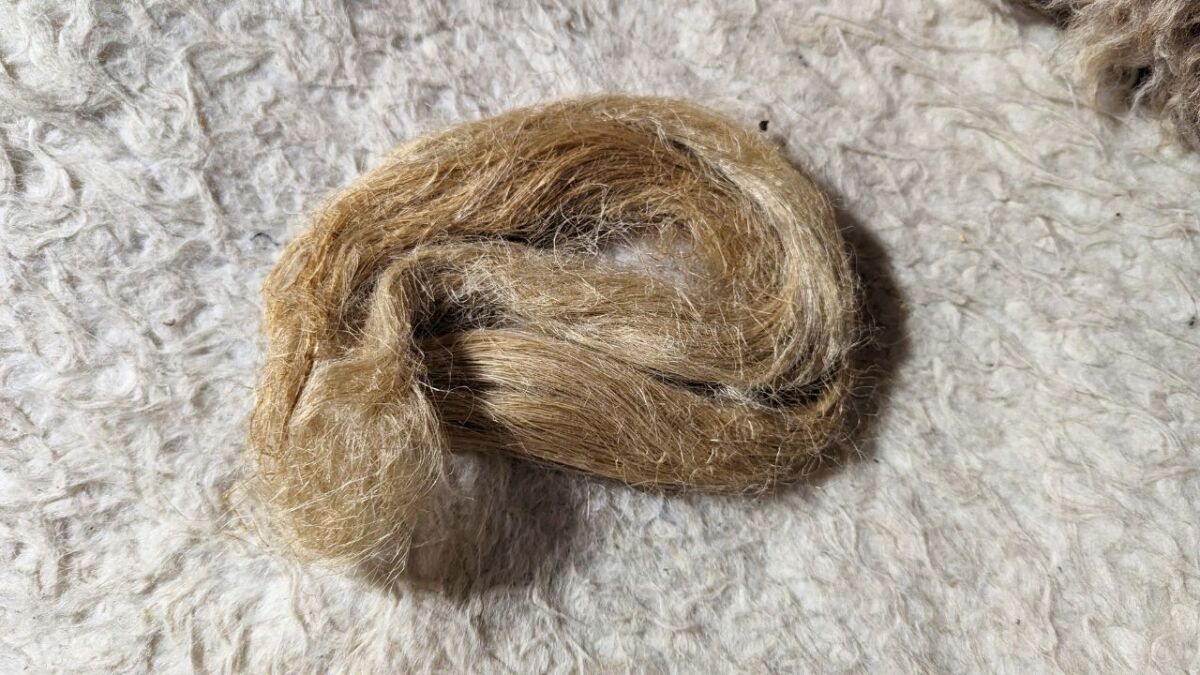
Cotton as a Cord - The Allrounder
Cotton, oh cotton! It is so ubiquitous in our lives that it is often overlooked. But do not underestimate it as a cord for your bow drill.
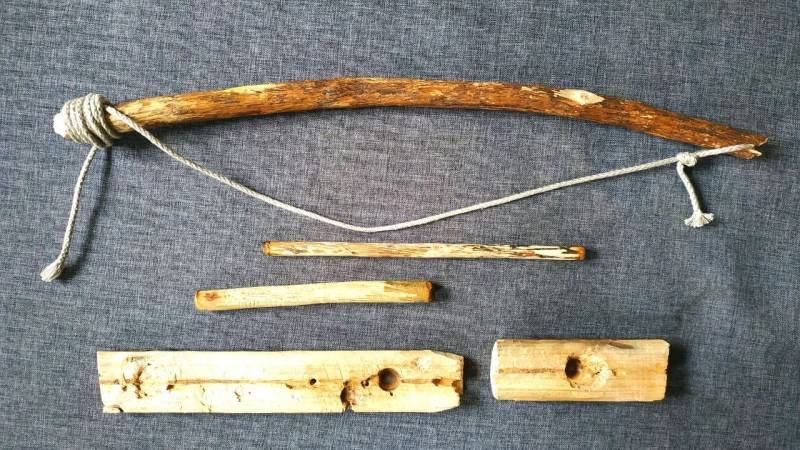
Cut three strips and braid them together. Your cotton bow drill cord is ready.
Cotton as cord for the bow drill? Here are the facts:
- Durability: Quite resilient when kept dry.
- Softness: Gentle on the hands, can be worked with for hours.
- Flexibility: Whether thick or thin, it moves with every motion.
- Sturdiness: Firm when needed, but does not tolerate moisture.
- Friction: Cotton and wood get along well, fire will thank you for it.
- Tension: Can stretch significantly - remember to re-tension.
- Environmental Friendliness: Unproblematic as a rope, biodegradable.
- Care and Maintenance: Keep it clean and dry, then it will be happy.
- Availability and Cost: Available at the hardware store or as an old T-shirt.
Cotton is not my first choice, but extremely useful in emergencies. Keep in mind that it is not very durable and stretches.
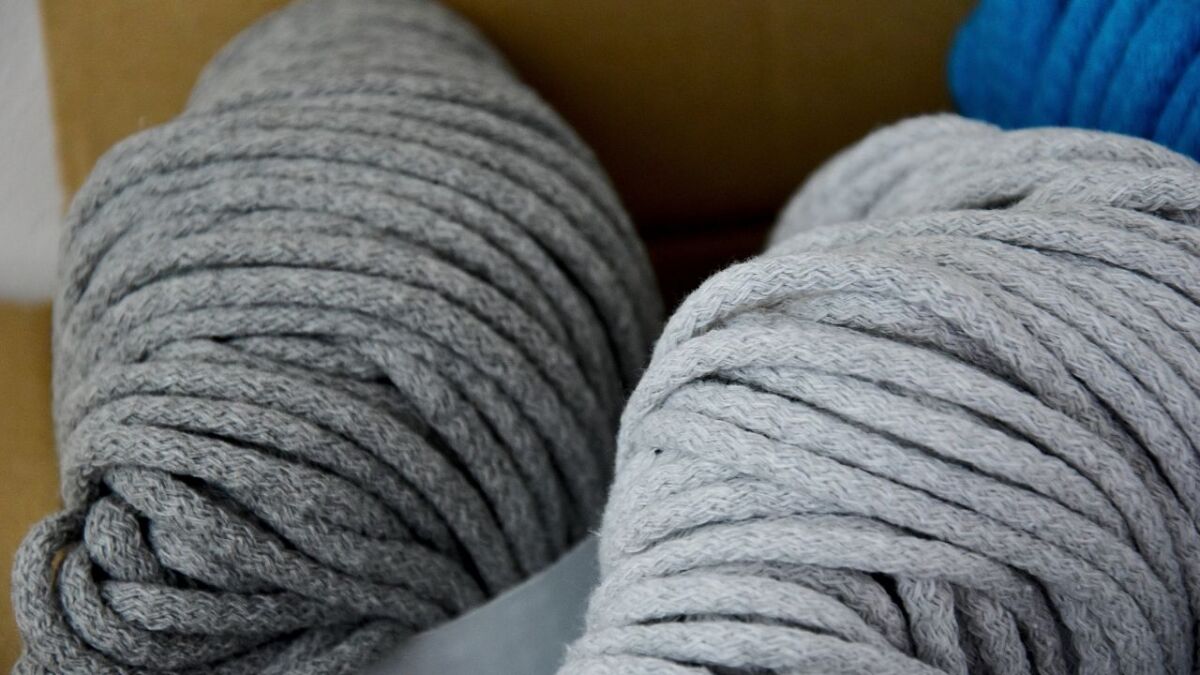
These materials, hemp, jute, nettle, bast, and cotton, are more than just tools. They are the connection line between heaven and earth, between your hands and the emerging fire. Choose wisely and with respect for nature, and the fire will give you its warm breath.
The modern twist: plastic cords for the bow drill
Enough of the nostalgia. Now let's jump into the present, grab the plastic strings, and see what they can do.
Let's dive into a world where tradition meets innovation, and we equip our bow drills with a modern flair.
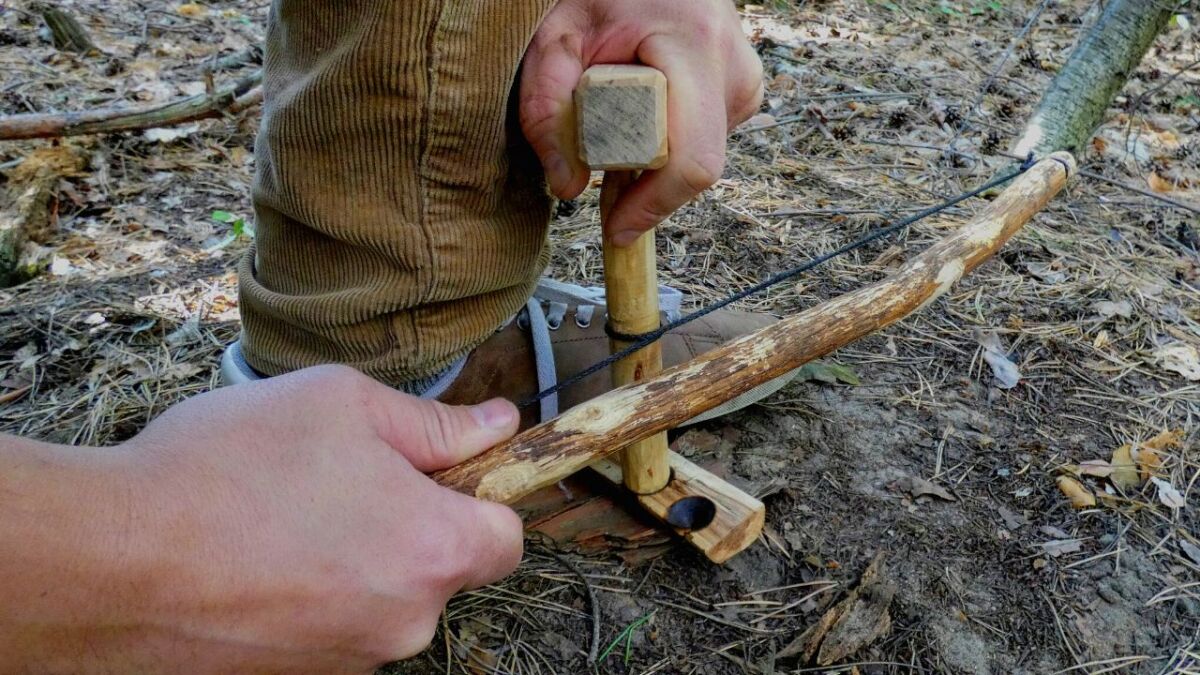
Paracord as Cord - The All-Rounder
Paracord, the star of the survival scene. Originally developed for parachutes, now the loyal companion in your backpack.
Paracord as cord for the fire bow drill? Here are the facts:
- Durability: Quite good, but it wears out and tears over time.
- Softness: Not the softest, but feels like it was made for your hands.
- Flexibility: You dictate the direction, paracord follows.
- Sturdiness: Paracord laughs at adversity. Rain? Dirt? No problem!
- Friction: Enough grip to ignite the fire. Poorly tensioned, it slips quickly, though.
- Tension: Holds tight, no ifs, ands, or buts.
- Environmental Friendliness: Not as green as hemp. Dispose of it in the regular trash, not in the forest.
- Care and Maintenance: Almost too easy. Keep it a little clean, done.
- Availability and Cost: Surprisingly affordable for a sturdy rope.
Paracord and I? We were like soulmates in the beginning. That's how I learned bow drilling.
"Paracord may not have grown with nature, but it has earned its place through hard work."
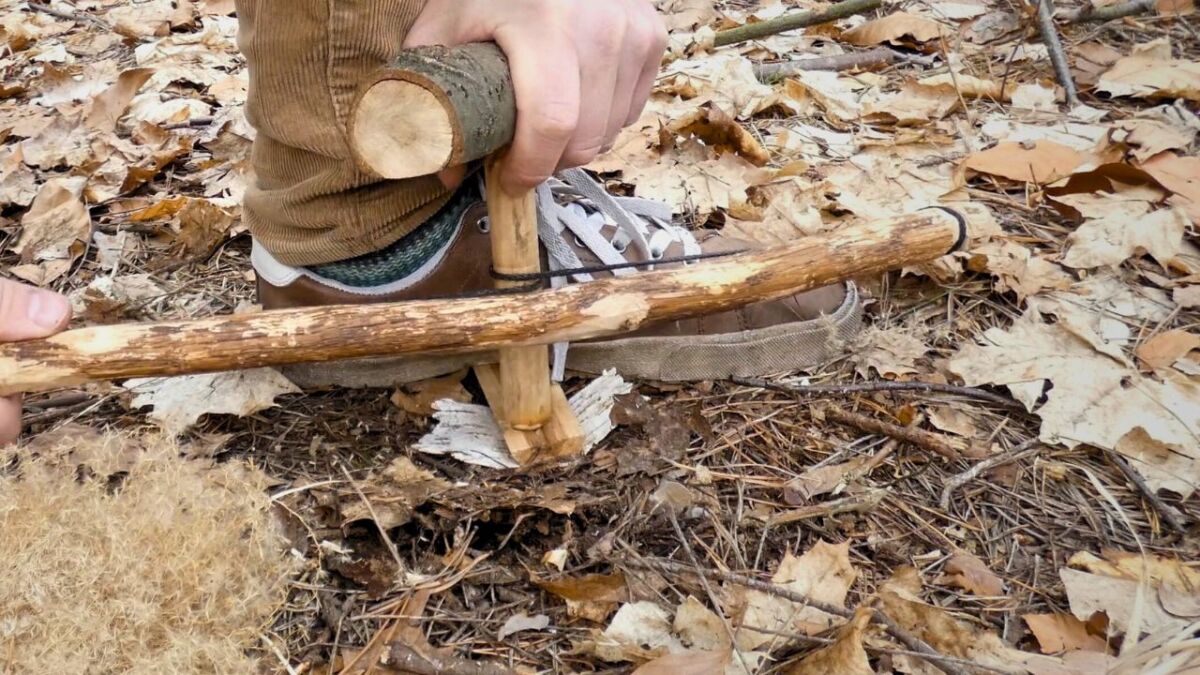
Polypropylene AS ROPE - The Lightweight Champion
Lightweight, strong, and it even floats - polypropylene is the lightweight that can withstand a lot.
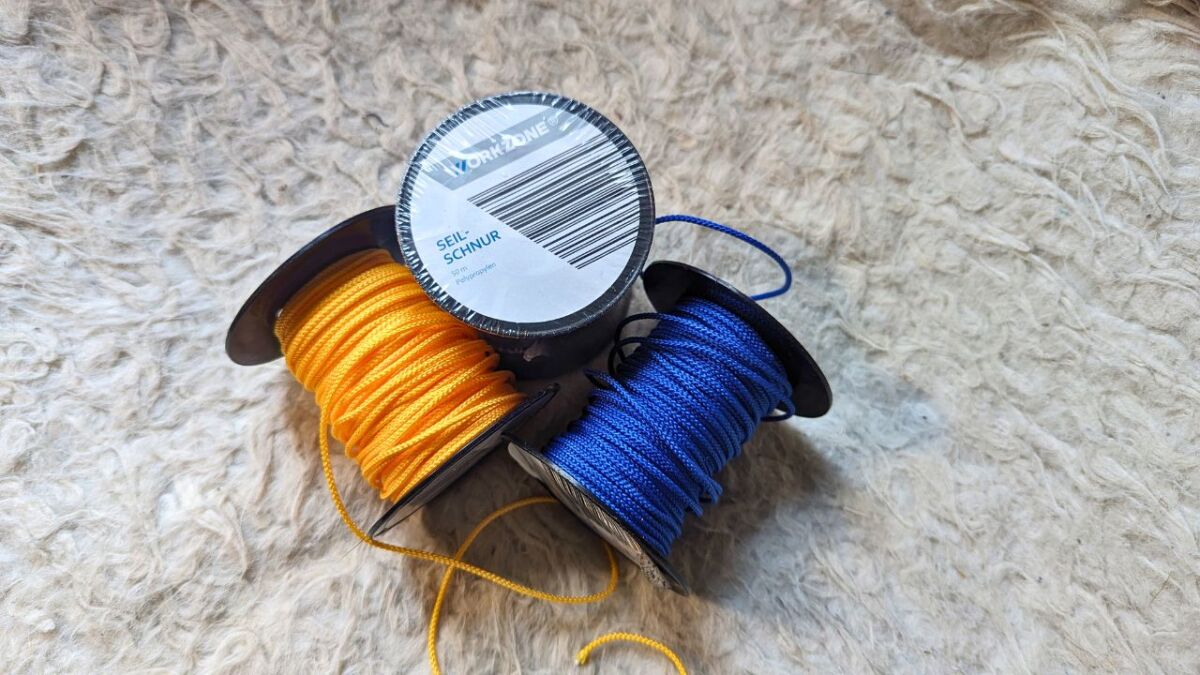
Read for yourself if polypropylene serves as a cord for the fire bow drill. Here are the facts:
- Durability: Extremely tough for such a lightweight companion.
- Softness: Polypropylene cord is unforgiving.
- Flexibility: Easily wraps loosely around any spindle.
- Robustness: Even thin, it is very resilient and tear-resistant.
- Friction: Could be better, but with the right technique, it works.
- Tension: Handles healthy tension well.
- Environmental Friendliness: It won't disappear on its own, so take good care of it.
- Care and Maintenance: Hardly any need.
- Availability and Cost: Almost a steal and can be found at the hardware store around the corner.
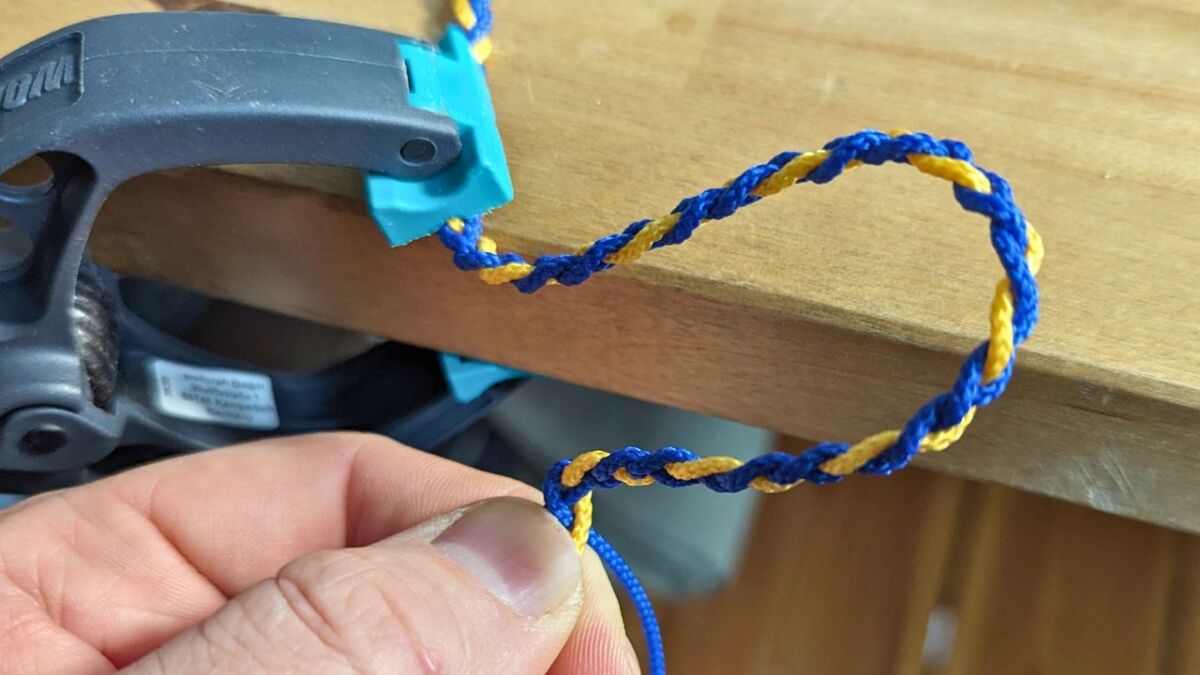
My encounters with polypropylene have not always been pleasant. I am not a fan of this string, as it has little grip and is not smooth enough for me.
Rope AS CORD - The Reliable One
When it comes to climbing, accessory cord is the rock in the surf. And the bow drill? Equally reliable.
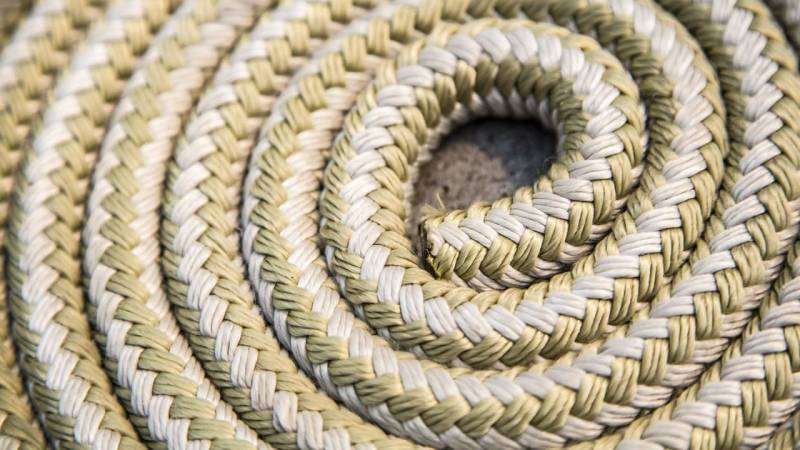
Rope as cord for the bow drill? Here are the facts:
- Durability: Not indestructible, but damn close.
- Softness: A bit stiffer, but your hands will quickly get used to it.
- Flexibility: Yields, but only as much as you allow it.
- Robustness: Built for the mountains, ready for your campfire.
- Friction: Ideal. Not too much, not too little.
- Tension: A fortress. No slipping, no weakness.
- Environmental Friendliness: Like with many plastics, a matter of responsibility.
- Care and Maintenance: Easy. A little care and it will last a lifetime.
- Availability and Cost: Easy to find at the hardware store or online, a bit higher in price.
With rope by my side, I have never felt insecure. It is the piece of reliability that accompanies you through the darkest hours by the fire.
Plastic strings are a tribute to human inventiveness. They show that tradition and modernity can form a strong duo. Choose them wisely, and they will not let you down.
Back to the Roots, with Special Materials: Cords and Ropes of Animal Origin
If you are looking for a string that is not only functional but also intertwined with a story, then dig deeper into the treasure chest of nature.
The traditional material for a bow drill was rawhide or leather. A strap made of this material is durable and securely holds the spindle in place.
These materials, which are both rustic and tested, bring you closer to nature. They demand respect, but offer an unparalleled bow drilling experience.
Buckskin - Soft and Strong
Buckskin, that is the skin of the wilderness itself, turned into a cord with which you make the fire dance.
Does buckskin work as a cord for the bow drill? Of course - and how!
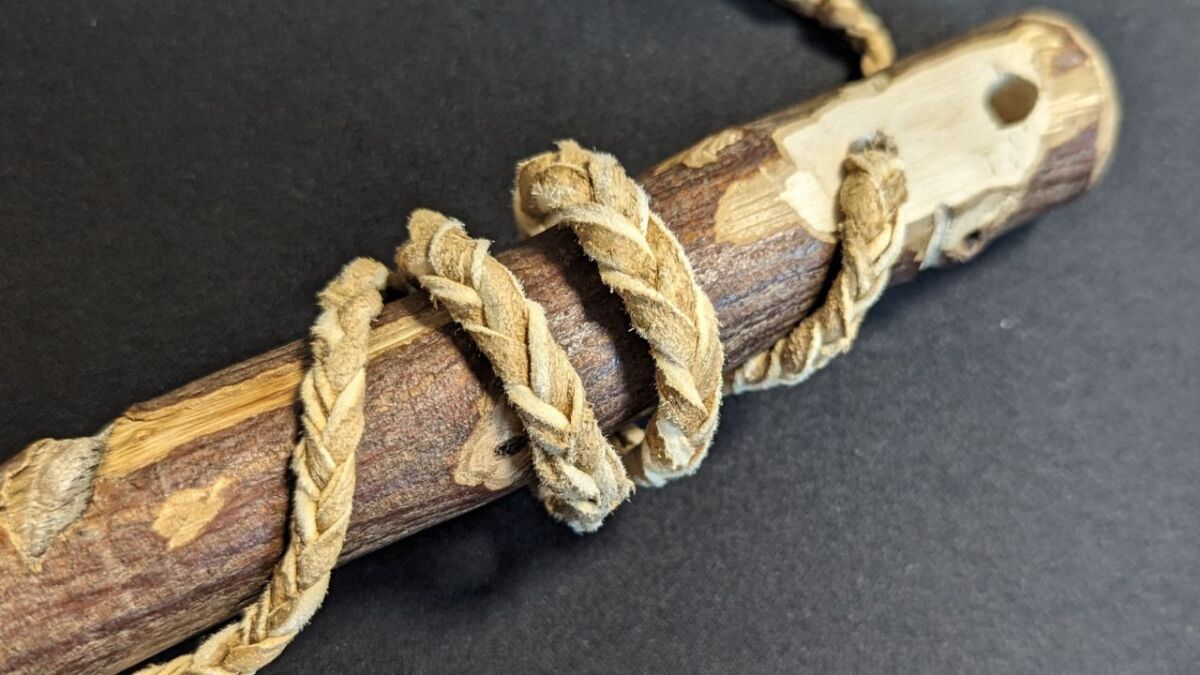
Here are the facts:
- Durability: Made to bring joy for many years.
- Softness: Like the gentle touch of dawn on your skin.
- Flexibility: It moves with your motions like a dance partner.
- Sturdiness: Seemingly delicate, but trust me, it's very tough.
- Friction: It binds to the spindle like the earth to the rain.
- Tension: It knows its limits, but remains reliable. Expect some initial stretching.
- Environmental Friendliness: As natural as can be - the forest gladly accepts it.
- Care and Maintenance: Care for it like your favorite knife and it will remain loyal to you.
- Availability and Cost: Not found on every corner, but worth every search.
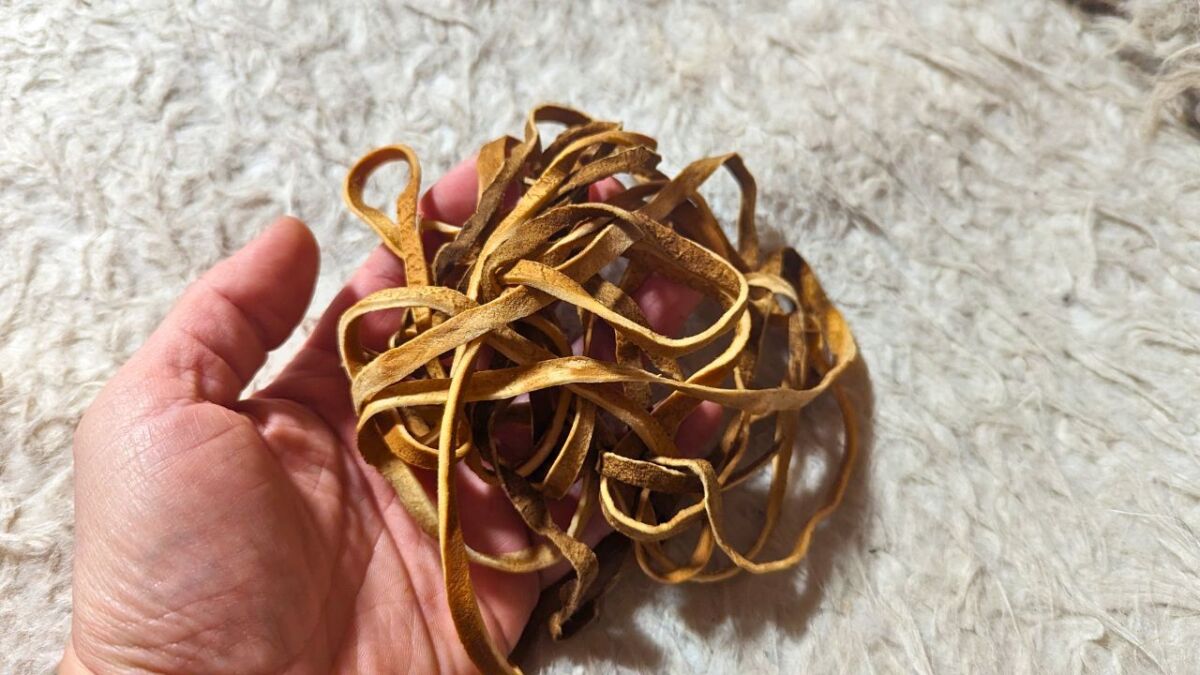
I greatly enjoy a buckskin cord for the bow drill. It is very robust, yet soft and provides an excellent grip on the spindle.
👉 But be careful: Cord made from industrial processing is usually not durable enough for the bow drill. I have cut many pieces of leather and the durability did not come close to buckskin.
Although the grip is fantastic with leather, you should always check if the individual strands are tear-resistant. This way you will have a lot of fun with your cord for a long time. And here too, you have to tighten a lot at the beginning.
Rawhide as Rope - Indestructible and Rich in Tradition
Rawhide is the rough, unpolished diamond among natural cords - indestructible, direct, and full of character.
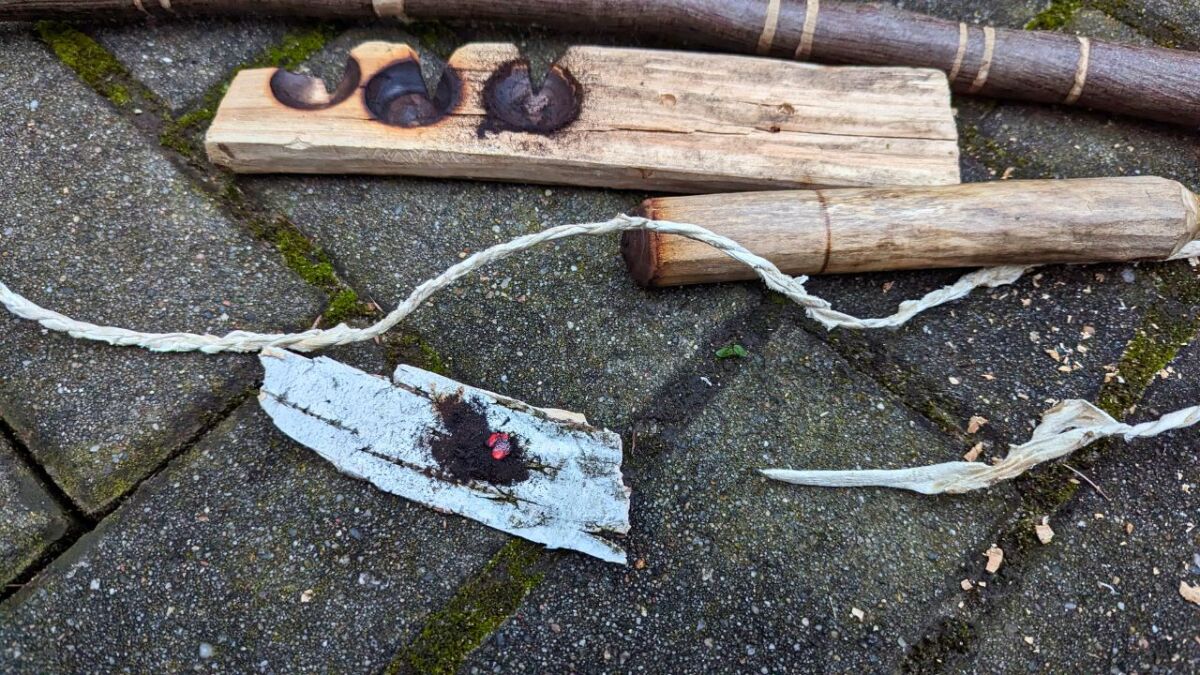
Rawhide as cord for the bow drill? Here are the facts:
- Durability: Almost legendary. It withstands heat, cold, and countless fires.
- Softness: There is nothing soft here, only pure toughness.
- Flexibility: Slightly stiffer than buckskin, but it gives way when treated properly.
- Robustness: Like an old sword that has seen many battles and emerged victorious.
- Friction: Enough resistance to ignite fire without sparing the wood.
- Tension: Holds once stretched. Needs to be tightened several times at the beginning.
- Environmental Friendliness: A product of nature, but respect is required in its extraction.
- Care and Maintenance: Wants to be understood and preserved, then it will be a loyal companion.
- Availability and Cost: Something for the connoisseur, not always easy to find, but valuable.
Rawhide and I have experienced some adventures together. While this material may be a bit harder to obtain and manufacture, I can only recommend it to you. Sturdy, reliable, and provides a good grip.
Animal sinew as cord - the ancestral wisdom
When I delve into the depths of traditional skills, I inevitably come across the pure origin of the most robust cords: animal sinews.
This cord is not just a ribbon - it is the legacy of our ancestors, a connection of respect and survival skills.
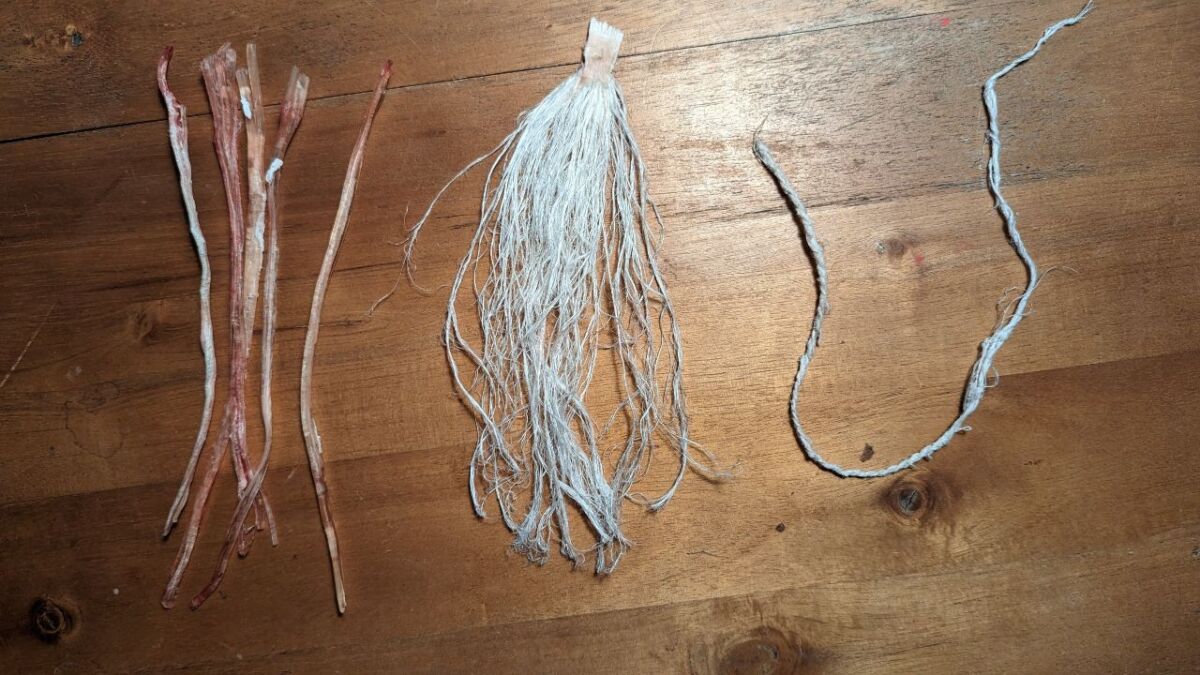
Animal tendon as cord for the bow drill? Here are the facts:
- Durability: What made the animal strong will also outlast your fire. It is extremely durable.
- Softness: Supple, yielding, and like a second skin for your hands.
- Flexibility: Animal sinew as a cord moves with an elegance only nature can create.
- Robustness: Born from the struggle for survival, unparalleled resilience.
- Friction: Animal sinew clings to the spindle as if made for it.
- Tension: Strong and powerful - animal sinew knows how to withstand pressure.
- Environmental Friendliness: As part of the circle of life, animal sinew is a true homage to nature.
- Care and Maintenance: Care for it diligently, and it will become part of your soul.
- Availability and Cost: Rare and precious, as animal sinew tells the story of life.
Animal sinew as a cord is not something I have used often, but whenever I did, I felt an almost forgotten wisdom in my hands.
She taught me humility and reminded me of the cycles that connect us all. When you choose animal sinew, you are not just tying a bow drill, you honor the life and legacy of the wilderness.
These special materials, buckskin, rawhide, and sinew, are more than just means to an end. They are witnesses of the past and provide the fire maker with a deeper connection to the roots of bushcraft.
If you pick them, you select more than just a string - you select a legacy and an experience that honors every flame.
The Fire in Your Hands - Which Cord for the bow drill Should It Be?
After years of collecting, testing, and sharing around the campfire, I know: The perfect cord for your bow drill is more than just a tool. It is a symbol of your connection to fire making, dedication to your craft.
Whether you prefer the earthy familiarity of natural fibers like hemp or jute, the technical reliability of modern wonders like Paracord, or the soul and tradition in Buckskin and rawhide - each cord whispers its story.
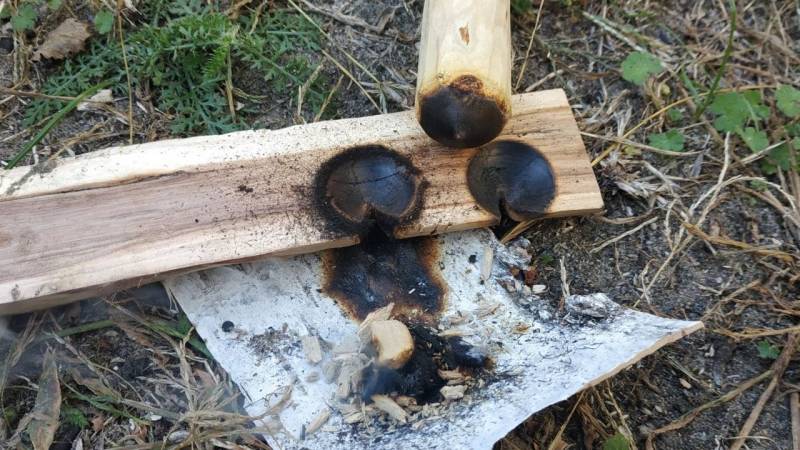
I have learned that the best way to find the right path is in alignment with your values, needs, and respect for the environment.
It's not just about igniting a fire. It's about the ritual, the preparation, and the celebration of the moment when sparks turn into flames.
I have held every string in my hands, each one showing me its strengths and weaknesses.
But they all have one thing in common: They have the potential to bring warmth and light into the darkness.
The cord you choose, the wood you shape, and the sparks you nurture - they are all chapters of your journey in the history of fire making.
Choose wisely, choose with heart, and the fire will always be a loyal companion on your journey through the wilderness.
And if you want to delve even deeper into bow drilling, you can find more content from me here:
- What is a fire bow drill and how does it work? (+free construction manual)
- Which wood for the fire bow drill? How to choose the best wood for your bow drill
- Common reasons why the fire bow drill fails and what solutions are available


Author of the guide
Martin Gebhardt
Hey, I'm Martin. On my blog, you will learn the basics and numerous details about living in the wild. I think survival, bushcraft and the good life in nature are the keys to happiness. Find me here on Instagram or on YouTube. You can find more about my mission on the About Me page.
Was this guide helpful?
18 people found this guide helpful.
5.00 out of 5 points (18 Ratings)
Comments (0)
This post may contain affiliate links. So if you click on the links and make a purchase, I will receive a small commission at no additional cost to you. Click here, to learn more about it.


